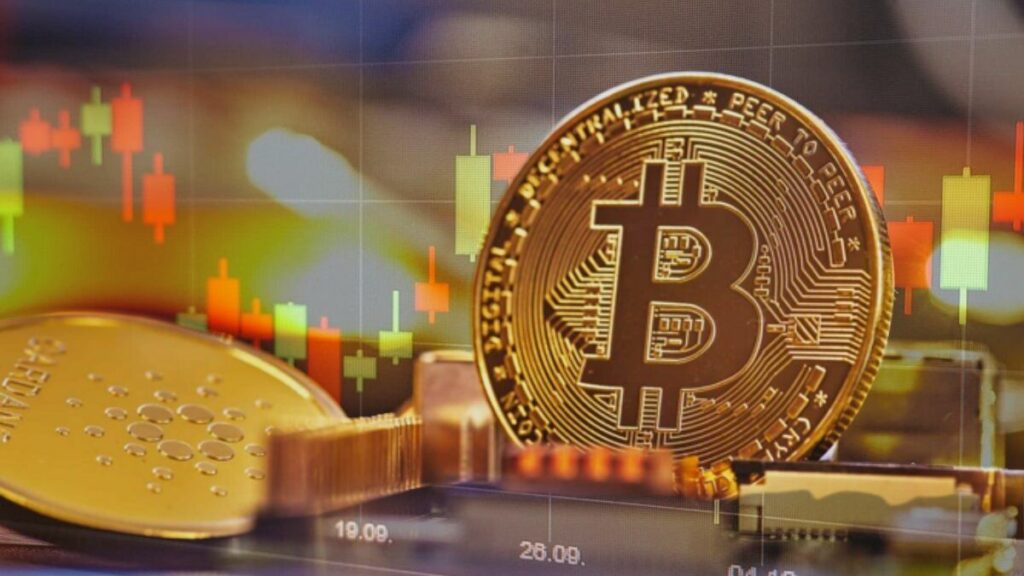In the face of declining inflation, the market craves a fresh force to elevate Bitcoin’s value. Despite regaining some footing since the previous week, the world’s largest cryptocurrency by market cap could be heading for its first monthly dip since last December.
At this moment, Bitcoin trades around $27,800, a refreshing 7.5% rebound from its previous lows under $25,900. However, this month’s decline is still about 5%, marking the first monthly downturn of the year (if this pattern persists until Wednesday’s UTC close). January, March, and April proved fruitful for Bitcoin, with February presenting a break-even scenario.
Compared to Ether (ETH), Bitcoin seems poised for an almost 7% monthly decline, but now let’s see whether it is a threat that is poised to happen and if there are any moving forces that suggest otherwise.
Betting Against the Current
Bitcoin’s less than stellar monthly performance coincides with bond traders’ renewed confidence that the Federal Reserve will maintain its heightened interest rates. This decision comes as a response to persistent inflation and a buoyant job market. The market no longer anticipates rate cuts from the Fed this year, causing a shift in expectations. In layman’s terms it means that TradFi is just that little bit more interesting to traders right now.
This shift in the market’s sentiment has strengthened the U.S. dollar this month, propelling it by 2.7% against a basket of fiat currencies, including the Euro. We should not that historically, Bitcoin tends to move in the opposite direction of the dollar.
Since early last year, capital has been trickling out of the crypto market. This month, this trend continues unabated, as the stablecoin market capitalization contracted to a 20-month low of $130 billion.
The crypto market is in need of a new trigger to push prices upwards. “The wave of liquidity from lower inflation seems to have vanished and we are now in need of new signals that boost the market,” observe some key opinion leaders.
Divergence from Nasdaq
Unlike the technology-driven Nasdaq index that boasts an 8% growth this month, Bitcoin’s trajectory has diverged. Yes, we do remember the increase in valuation that took place a few days ago, but traders need to see more.
Griffin Ardern, a volatility trader at crypto asset management firm Blofin, warns that the persisting high-interest rates are not in Bitcoin bulls’ favour. “In this environment, risk-free returns like money market funds become more appealing to investors, leading to a continued liquidity squeeze in the crypto market,” he explains.
According to Gate.io cryptocurrency exchange, Bitcoin’s 4% surge acted as a short respite, triggered by U.S. leaders’ announcement of a deal to elevate the $31.4 trillion debt ceiling hit in January. However, Dick Lo, founder and CEO of quant-driven crypto trading firm TDX, cautions that further gains might not be easy to come by.
BTC market sentiment

Even though the crypto market, especially Bitcoin, has been facing a challenging period recently, with five consecutive weeks of outflows and trading volumes on trusted exchanges at their lowest since late 2020, it’s essential to remember that volatility is part of the cryptocurrency sector. In fact, Bitcoin and Ether, despite experiencing a dip in prices in May 2023, are expected to see bigger fluctuations, both up and down, owing to the thinner liquidity in the market this year.
Moreover, analysts aren’t overly concerned about these price declines, as they understand the inherent nature of crypto markets. Currently, there’s anticipation for a potential turn-around in the market, with traders keenly waiting for a new catalyst to set off more active trading.
Key discussions such as the U.S. debt ceiling negotiations could serve as this catalyst. These can influence the price of Bitcoin and other cryptocurrencies for a few reasons:
Economic Uncertainty
Cryptocurrencies like Bitcoin are often viewed as “digital gold” and can be seen as a hedge against economic uncertainty. If negotiations over the U.S. debt ceiling lead to fears of a default or another negative economic outcome, investors might turn to Bitcoin as a safer place to store value, driving up demand and thus its price.
Inflation Concerns
If the U.S. raises its debt ceiling, this could lead to more government borrowing and potentially more money being pumped into the economy. This can spark fears of inflation, which may cause investors to move their assets into Bitcoin, seen as a deflationary asset due to its limited supply.
Market Sentiment
The debt ceiling negotiations can affect overall market sentiment. If these negotiations are resolved smoothly, it could boost confidence in the financial markets, possibly leading to increased risk-taking. This could benefit Bitcoin and other cryptocurrencies, which are often seen as riskier assets.
Dollar Value
Bitcoin is often inversely correlated with the U.S. dollar. If the debt ceiling negotiations result in a weaker dollar, this could potentially increase the price of Bitcoin.
Despite the short-term setbacks, the crypto market, including Bitcoin, continues to be an exciting space with significant potential for future growth. Analysts are keeping a close eye on macroeconomic factors that could trigger a positive shift in the market.
Summary
As of May 2023, Bitcoin and the broader cryptocurrency market are experiencing a downturn, marked by consecutive weeks of outflows and reduced trading volumes. However, this volatility is characteristic of the crypto sector, and analysts remain optimistic despite the current lull.
Cryptocurrencies, particularly Bitcoin, are often seen as a hedge against economic uncertainty. If these negotiations prompt concerns about the economy or inflation, or result in a weaker U.S. dollar, we might see increased demand for Bitcoin. Conversely, a smooth resolution to the debt ceiling discussions could boost overall market confidence, potentially benefiting riskier assets like Bitcoin.
Press releases or guest posts published by Crypto Economy have sent by companies or their representatives. Crypto Economy is not part of any of these agencies, projects or platforms. At Crypto Economy we do not give investment advice and encourage our readers to do their own research.










